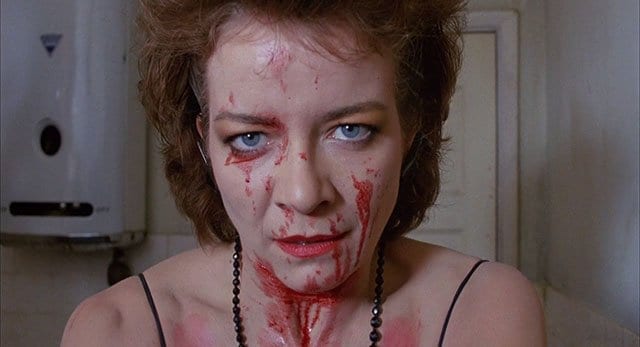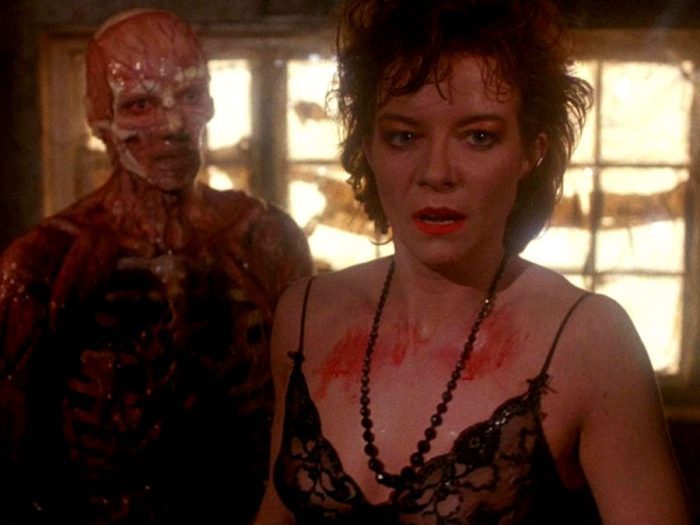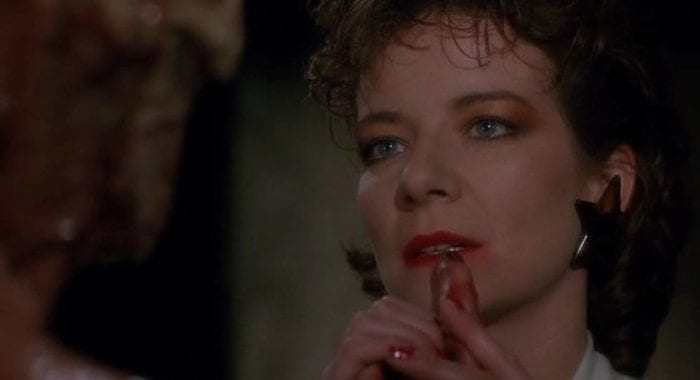I’d be willing to bet that Hellraiser isn’t the first title that comes to mind when you think about horror movies with good moral messages. Hell, it’s probably not even the last one. Most people don’t associate this film with morality at all, except maybe in a subversive sense, and I totally understand why. It’s a story about extreme hedonism told with gross-out gore effects and a BDSM aesthetic, so at first glance, Hellraiser doesn’t seem like a particularly moral movie.
But if you look beneath the surface, you’ll find that there’s actually a lot more to this film than you might expect. At its core, Hellraiser is essentially a story of good versus evil, and unsurprisingly, its depiction of the darker side of life is particularly memorable. Not only does this movie feature some of the coolest horror villains ever created, but it also does an excellent job of communicating a deep truth about the nature of evil. It masterfully shows us the terrible consequences of letting evil fester and grow in our hearts, so let’s take a deep dive into this classic film and see just how it conveys its often-forgotten moral message.
The Beginning of Julia’s Descent

While most people associate Hellraiser with Pinhead and the Cenobites, the real bad guy of this film is actually a human woman named Julia. When the movie begins, she seems like a normal, decent person, but as you can probably guess, she has a hidden dark side. She’s currently married to a nice man named Larry, but before their wedding, she had a brief affair with his bad-boy brother Frank. Apparently, Larry never found out about her infidelity, but she’s never forgotten it.
When she finds a bunch of pictures of Frank in their new home, she remembers just how passionate their affair was, and during one scene, it even looks like she’s reliving every second of pleasure they ever had together. It’s obvious that Julia still wants him, so while she may not be literally cheating on her husband anymore, she’s still unfaithful to him in her heart.
And that’s the beginning of her descent into pure evil. It starts with just one night, one fleeting moment of infidelity. Then it moves on to some erotic thoughts, and at first these transgressions may seem fairly inconsequential. Sure, Larry wouldn’t want his soon-to-be-wife to sleep with his brother, but what he doesn’t know can’t hurt him. And if that’s the case, then Julia’s fantasies about that night are even more innocuous. Not only will Larry never find out about them, but she’s not even doing anything. They’re just thoughts, and what’s the harm in that?
Rocketing to Rock Bottom

As it turns out, Julia’s affair and her vivid memories of it are actually the catalyst for the rest of the story. She was so enchanted by Frank that she promised she’d do anything for him, and that promise leads her to commit unspeakable crimes. See, unbeknownst to Larry and Julia, Frank has been captured by the Cenobites, and when Larry cuts his hand moving a mattress into their new house, he unwittingly frees his brother from his hellish confinement.
Julia is the first one to find him, and when she does, he’s not quite the same guy she remembers so fondly. His body has only been partially regenerated, so he looks more like a monster than a man. It’s pretty disgusting, and initially, Julia doesn’t even recognize the guy. However, after Frank tells her it’s him, she remembers her ill-fated promise. She remembers that she’d do anything for this man, so she agrees to pick up random strangers and bring them back to him so he can use their life force to fully regenerate his body.
Interestingly, the first time she does this, she’s clearly uncomfortable with the process. From the moment she walks into the house with her intended victim, her body language, facial expressions, and tone of voice just ooze nervousness and unease. She’s obviously never killed anyone before, so this whole experience weighs pretty heavily on her. In fact, after she mortally wounds the guy and leaves him for Frank to finish off, she goes to the bathroom to wash up a bit, and she’s shaking from the horror of what she just did. The impact of her dreadful actions hits her so hard that it affects her physically, and she needs a bit of time to decompress.
What’s more, when Frank asks her to do it again, she initially says no. Again, it’s clear that luring a man to his death was super traumatic for Julia, so she doesn’t want to go through that harrowing experience ever again. However, Frank still isn’t fully healed, so she eventually relents and agrees to bring him more victims. And unsurprisingly, the second time she does it, she’s much calmer and more confident. She shows no signs of distress or discomfiture, so she’s already becoming a pro at this grisly business.
Julia does this a few more times throughout Hellraiser, and the last time she does, she lets Frank take Larry as his final victim. To her credit, she initially resists the idea. There’s a scene where Larry and Julia start kissing on their bed, and as Frank inches closer with a knife in his hand, Julia screams and pleads with him not to do it. She says she can’t bear to see him kill her husband, and mercifully, Frank backs away and lets his brother live.
But unfortunately, this last gasp of Julia’s conscience doesn’t last very long. Soon enough, she gives in and takes Larry to the room where his brother lurks, and with that final act of betrayal, her descent into evil is complete. Not only has she been leading random strangers to their deaths, but now she’s also led her husband, the man she vowed to love for the rest of their lives, to the same fate. It’s obvious that she only cares about continuing her affair with Frank and experiencing the same illicit pleasure she felt the first time they met, and she’s more than willing to kill anyone who gets in her way.
The Moral Message of Hellraiser

When we lay out Julia’s arc in Hellraiser that way, the moral message of the film becomes pretty easy to see. It’s showing us that evil can easily snowball and get out of control if we don’t nip it in the bud. See, every good or bad act we perform helps to mold us into a certain kind of person, for better or for worse. For example, if I tell a lie to get out of a tough situation, that act starts to form me into the kind of person who’s comfortable lying. Granted, a single lie won’t completely change who I am, but every lie I tell will move me closer and closer to becoming a flat-out liar. And the opposite is true as well. If I tell the truth in a situation where lying would be easier and more convenient, I move myself in the other direction, towards becoming an honest person.
And something similar happens to Julia in Hellraiser. Before her affair with Frank, she’s apparently a good person, but that one bad decision sets off a chain reaction that eventually turns her into a straight-up serial killer. First, she cheats on her fiance. Then, because she gave into the affair so completely, she can’t get Frank out of her head, so she continues to fantasize about him even after he’s been out of her life for a while. Next, she starts luring random strangers to their deaths in order to help him fully regenerate his body, and even though she’s not entirely comfortable doing that at first, it soon becomes second nature to her.
Each step along that path molds her moral character and forms her into an increasingly evil person, and Julia eventually becomes so bad that she’s even willing to sacrifice the last vestige of conscience she has left. In fact, while we don’t know much about who she was before she met Frank, I’d be willing to bet that her younger self wouldn’t even recognize the person she becomes by the end of the movie. She completely corrupts herself, and her headlong descent into evil can serve as a powerful cautionary tale for us.
We always need to be on guard against making the same mistake she did. Sure, we’re not perfect, so we’re inevitably going to do some bad things every now and then. But the key is to make sure those moral slip-ups don’t escalate into something worse. Even seemingly small things we think nobody will notice can lead us down a dark path if we let them, so we always have to be careful not to fall into that trap.




I love this. It’s a very interesting way to look at the movie. I’d never really considered Julia’s moral standing outside the events of Hellraiser.